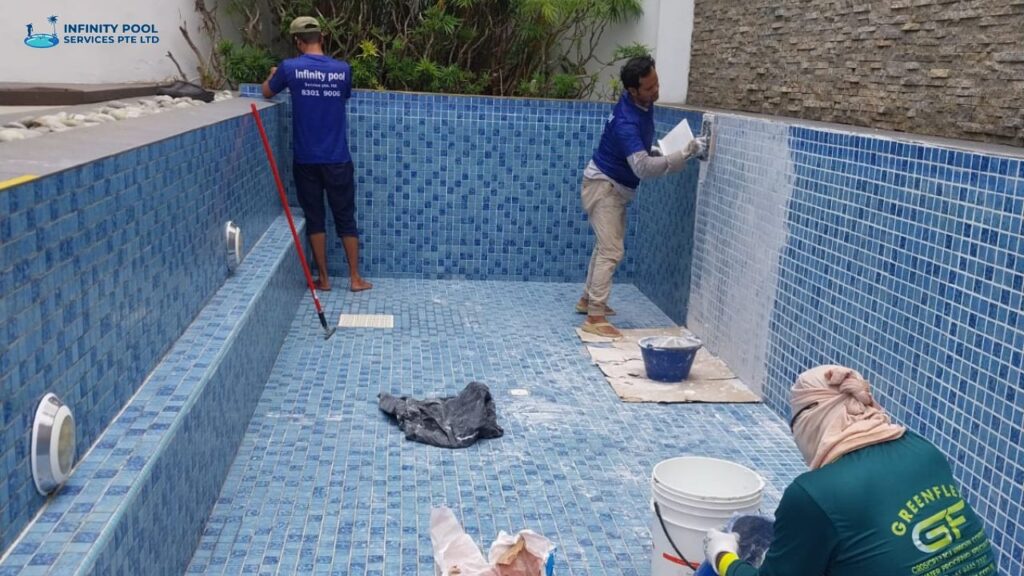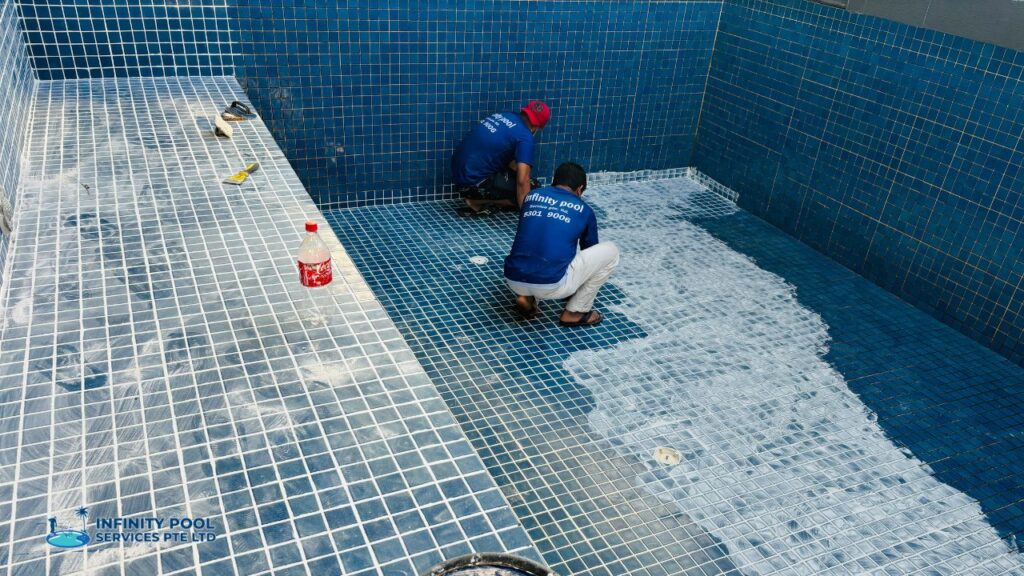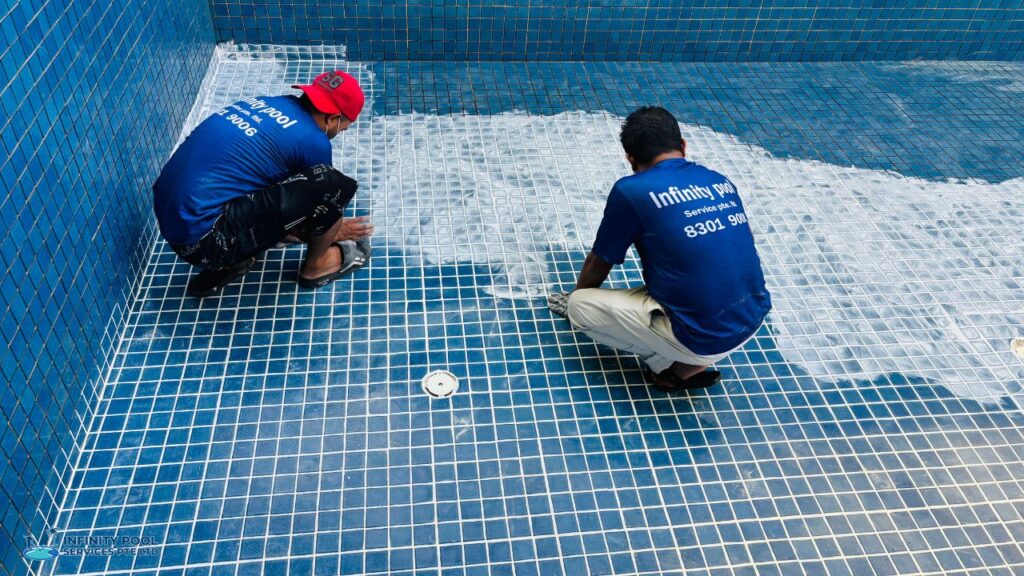Owning a Swimming Pool in Singapore is a true luxury, but keeping it in perfect condition takes regular care. Over time, the grout between your pool tiles begins to crack, discolor, or loosen, making the pool look tired and unsafe. This is where Professional Swimming Pool Regrouting Services in Singapore become essential.
From my experience working with homeowners, I’ve seen how regrouting not only restores the beauty of a pool but also protects it from leaks, algae, and costly long-term damage. If you want your pool to stay safe, hygienic, and as stunning as the day it was built, regrouting is one of the smartest maintenance steps you can take.
What is Pool Regrouting and Why Does It Matter?
Pool regrouting is basically the process of removing the old, damaged grout between your pool tiles and replacing it with fresh, waterproof grout. Many people confuse it with simple cleaning, but it’s much more than that.
Think of grout as the glue that keeps your tiles in place and your pool sealed. Without strong grout, your tiles loosen, water leaks out, and mold makes a permanent home. In Singapore’s humid weather, this problem only gets worse. Regrouting helps your pool stay durable, safe, and beautiful for years.
Signs Your Pool Needs Regrouting
Over time, I’ve learned that most pool owners don’t even realize their pool needs regrouting until the signs become obvious. Some clear red flags include:
- Cracked or missing grout – I’ve seen cases where kids cut their feet on sharp tile edges because grout had completely disappeared.
- Cloudy water despite regular cleaning – Bad grout can trap dirt and release it back into the water.
- Persistent algae growth – No matter how much chlorine you use, algae loves old grout.
- Leaks or increased water bills – Damaged grout often leads to slow but steady water loss.
- Tiles shifting or feeling loose – This is not just cosmetic; it’s a real safety hazard.
If you’ve noticed one or more of these, it’s time to call in a professional.

The Benefits of Professional Pool Regrouting Services in Singapore
Over the years, I’ve had clients tell me how shocked they were at the transformation after professional regrouting. Here’s what you gain:
- Safety first – Smooth grout lines mean no sharp edges, no slipping, and no hidden mold.
- A stunning makeover – A freshly regrouted pool often looks brand-new, even if it’s over 10 years old.
- Longer pool lifespan – Prevents tiles from loosening and avoids expensive structural repairs.
- Cleaner, healthier water – Fresh grout makes it harder for bacteria and mildew to grow.
- Added property value – Especially in Singapore, where homes with private pools are premium, a well-maintained pool boosts overall value.
Why DIY Regrouting Often Fails (And Costs More in the Long Run)
I’ve seen some homeowners admit they tried DIY regrouting before calling a professional. Almost all of them regretted it. Here’s why:
- Without the right tools, the grout often looks uneven or cracks within months.
- Many don’t remove old grout properly, which causes the new layer to peel off.
- DIY grout mixes aren’t always waterproof or pool-safe.
- The effort is massive, and the results are usually temporary.
The professionals had to redo several pools where DIY attempts caused more damage than the original problem. In the long run, professional regrouting actually saves both time and money.
Choosing the Right Pool Regrouting Service in Singapore
Over the years, I’ve noticed not all services are equal. Here’s what I always advise homeowners to check:
- Experience and portfolio of completed pool projects.
- Whether they use pool-safe, waterproof grout.
- Reviews and recommendations from past clients.
- Clear and upfront pricing (no hidden charges).
- Warranty or service guarantees offered.
Note: A good service provider like Infinity Pool Services won’t just repair your pool; they’ll give you peace of mind.
The Professional Pool Regrouting Services for Private Homes in Singapore Process (Step-by-Step)
Clients often ask me how the process works, so here’s what typically happens:
Inspection: The first step is always a careful inspection. Professionals assess the entire pool, looking at the grout, tiles, and even the waterline. This helps identify not just visible cracks but also hidden leaks or early signs of tile shifting. A proper inspection ensures that no small problem is overlooked before regrouting begins.
Grout Removal: Old, damaged grout is carefully scraped out using specialized tools. This stage is important because if even a thin layer of weak grout remains, the new application won’t bond properly. Skilled technicians know how to remove grout without scratching or damaging delicate tiles, which is where DIY jobs often go wrong.
Cleaning: Once the grout is removed, all tile surfaces need deep cleaning. Over time, calcium deposits, dirt, and algae can build up on the tiles. This step ensures the surface is smooth and ready for new grout. A thoroughly cleaned base makes the fresh grout last much longer and helps keep the pool water crystal clear.
Fresh Grout Application: Now comes the most important part: applying new grout. Professionals use high-quality, waterproof grout that’s specially designed for swimming pools. The grout is applied evenly between tiles, filling every gap to create a strong and watertight seal. A neat application also improves the overall look of the pool, making it appear refreshed and new.
Sealing: After the grout sets, a protective sealant is applied. This step is crucial because it shields the grout from Singapore’s humid climate, reducing the chances of mold, mildew, and algae growth. It also helps prevent stains and ensures the grout maintains its color and strength for years.
Final Cleanup and Refill: Once everything is cured and sealed, the pool gets a final cleanup to remove dust or debris from the process. The pool is then refilled with water, and technicians test it to make sure there are no leaks and that the water chemistry is balanced. This final step ensures the pool is safe, beautiful, and ready for use. This step-by-step process makes a huge difference in the final result.
Common Mistakes Homeowners Make When Delaying Pool Regrouting
One of the biggest mistakes I’ve seen is homeowners ignoring small cracks, thinking they’ll fix them later. Unfortunately, delaying regrouting often makes the situation much worse. Here’s what usually happens:
- Tiles start loosening and popping off – Once grout weakens, tiles don’t stay in place.
- Water leakage increases repair costs – What could have been a simple regrout turns into a structural repair.
- Algae spreads deeper – Mold and algae embed into grout lines. These make cleaning almost impossible.
- Safety risks grow – I’ve seen children get minor injuries from sharp tile edges left exposed.
In short, postponing regrouting always ends up costing more; financially and in terms of safety.
How Often Should You Regrout Your Pool?
In Singapore’s tropical climate, grout tends to wear faster due to constant humidity and heavy rainfall. On average, most private pools need regrouting every 7–10 years. That said, regular inspections can help extend the life of your grout. I usually recommend homeowners check their pools twice a year: before the rainy season and after heavy use during holidays.
Latest Trends in Pool Regrouting for Singapore Homes
Pool design and maintenance have come a long way, and regrouting isn’t just about repairs anymore. Many homeowners are now choosing regrouting as part of their pool’s makeover. Some popular trends I’ve noticed include:
- Coloured grout for aesthetics – Instead of plain white, homeowners are using blues, greys, or even black to match pool themes.
- Eco-friendly grout solutions – Materials that are less harsh on the environment but still long-lasting.
- Anti-mold and anti-bacterial grout – Special formulas designed to resist Singapore’s humidity.
- Luxury finishes – Pairing regrouting with pool lighting upgrades for a complete transformation.
These trends show that regrouting isn’t just maintenance; it’s also an opportunity to refresh your pool’s style and functionality.
Pool Maintenance Tips After Regrouting
I always tell clients: regrouting is not the end. It’s the beginning of better pool care. Here are some tips:
- Brush tiles weekly to prevent algae build-up.
- Avoid using harsh cleaners that can weaken grout.
- Keep pool chemistry balanced to protect both grout and water quality.
- Schedule a professional inspection every couple of years.
These small steps keep your pool fresh and reduce the need for frequent major repairs.
Why Professional Pool Regrouting is the Smart Choice for Singapore Homes
From my experience, I can confidently say professional regrouting is one of the smartest maintenance decisions for pool owners in Singapore. It saves money, enhances beauty, and keeps your family safe. Whether it’s a cozy family pool or a luxury villa showpiece, fresh grout always makes a difference.
Final Words
Owning a private pool in Singapore is a luxury, but maintaining it should never feel like a burden. With expert regrouting, your pool can look new, stay safe, and last for many more years. If you’ve been putting it off, I encourage you to take the next step. Trust me, once you see the results, you’ll wonder why you didn’t do it earlier. If you’re still confused about the impact of professional pool regrouting services for private homes in Singapore, reach out to Infinity Pool now. Let us renew your pool without any hassle.


